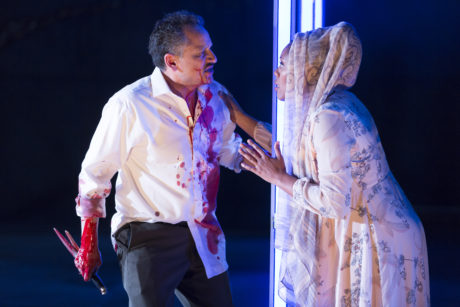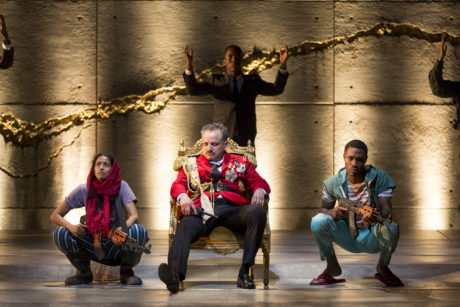Blood will have blood—so go the grim words of Macbeth as it dawns on him that murder is not as simple as he once thought. When it comes to battling and bloodshed, Shakespeare Theatre Company’s production delivers. But rather than depicting kings and battles from Shakespeare’s day, Tony-award-winning director Liesl Tommy has turned this story into one that provides powerful lessons for today.

This Macbeth is set in a Scotland that has been reimagined as an African country toeing a fragile line between peace and civil war. The play opens to the chaos of war: a cacophony of battling, bloodshed, and betrayal that mirrors the later developments of the play. There is a stark distinction between nobility and the common people, as everyone connected to and including Queen Duncan (Petronia Paley) wears a soldier’s uniform—always, it seems, ready for battle. The majority of the cast is made up of people of color; noticeably, the only caucasian cast members are the Witches (David Bishins, Tim Getman, and Naomi Jacobson) and Hecate (Stephen Elrod). What unfolds is a remarkably timely story: rather than beings with superpowers, the witches are actually Western intelligence operatives manipulating Macbeth into destabilizing the political structure of this country in order to gain easy access to its natural resources.
Jesse J. Perez’s Macbeth is strident and dynamic from the moment he steps onto the stage. No weak-willed puppet pushed along by his wife, he and Lady Macbeth (Nikkole Salter) make for a formidable couple whose unraveling is riveting to watch. Once Macbeth and his wife gain the throne, they appear, sparkling and glamorous, ready to greet their subjects for a dinner of the high elite. But for Macbeth, tormented by his desire to hold on to his power, this is not enough—he turns more and more to people outside his military elite for help in carrying out his increasingly twisted orders.
Two street urchins (Brayden Simpson and Anu Yadav) carry out the murder of Banquo. McKinley Belcher III captures both the tender moments Banquo shares with his son Fleance (Brett Johnson), and the cold-blooded ghost out for revenge on Macbeth, his former friend. Marcus Naylor plays Duncan’s trusted officer Macduff, who defends his queen, his family, and his country with fierce passion, inspiring Malcolm (Corey Allen) to come out of hiding and seek his birthright. Myra Lucretia Taylor’s Porter injects some much-needed comic relief into the otherwise gut-wrenching events of the play.

Liesl Tommy’s concept is remarkable in its execution. Scenic Designer John Coyne has created a world that shifts between the glamorous and austere: tall granite walls give a stark, militant feel, but a vein of gold runs through the length of the back wall. Lighting Designer Colin K. Bills’ technique of injecting “natural” light through high, unseen windows give the set a prison-like feel, while his LED light poles shift around the set to create the visual effect of anything from a guerrilla battleground to a red carpet appearance. Broken Chord’s dissonant original music and sound design keep the atmosphere firmly on edge; in particular, they use the distant sound of a baby crying to underscore Lady Macbeth’s childlessness and eventual descent into madness.
STC’s production is not for the faint of heart. But it is one that we all need to see: in a country where even now we are debating how much we as a nation should engage in the world, this Macbeth offers a chilling narrative of how this influence, and the siren call of power, can be used for evil.
Running Time: Two hours and 50 minutes, with a 15-minute intermission.
Macbeth plays through May 28, 2017, at the Shakespeare Theatre Company’s Sidney Harman Hall – 610 F Street NW, in Washington, D.C. For tickets, call the box office at (202) 546-1122, or purchase them online.





